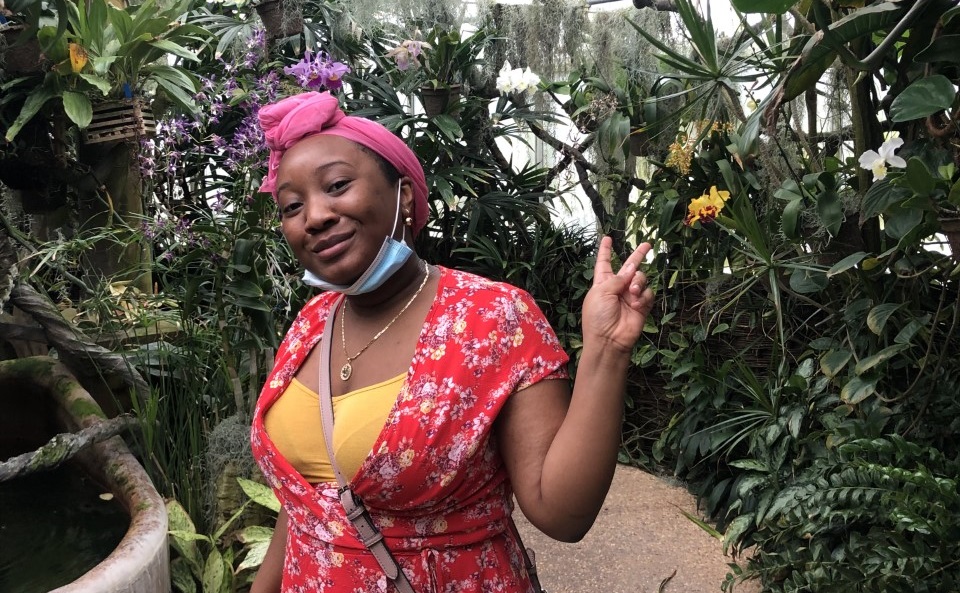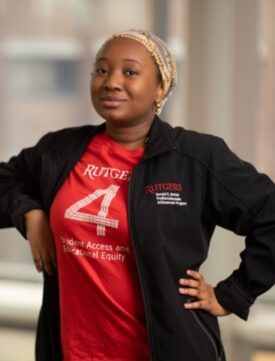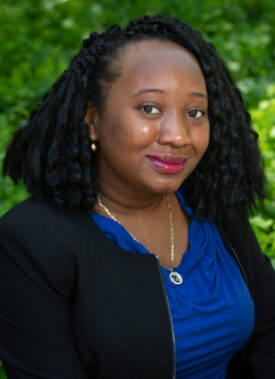
Toyosi Dickson (SEBS’20) at the Doris Duke Center during her participation in the Doris Duke Charitable Foundation’s Environmental Fellows Program.
From as far back as Toyosi Dickson (SEBS’20) can remember, getting a college education was non-negotiable.
“First things first, my family made sure above all else that I knew I needed a college degree to succeed in life. There’d be times when I’d come home from kindergarten and complain about how long it was. My mother would tell me I can’t take that attitude in college. At the time, I didn’t know what that was, but I assumed it was important. And it was, as it did do the job of instilling in me that college is a necessity in this world and I just happened to find that intrinsic motivation to get my degree,” she remembers.
Following the prescribed path from high school to college, Toyosi enrolled in Rutgers School of Environmental and Biological Sciences (SEBS), earning a bachelor’s degree in Environmental Science, which also happens to be her concentration.
During her final semester at SEBS, and immediately after she submitted her honors senior thesis, she remembers completing her enrollment in University of Michigan’s School of Environment and Sustainability (SEAS) master’s program. She was drawn to a concentration in Environmental Justice.

Toyosi Dickson (SEBS’20) at Rutgers.
“I enjoyed my time at Rutgers, but I could see the writing on the wall that a purely STEM background would limit my engaging with growing opportunities in community collaboration between academia and low-income BIPOC (Black, Indigenous, and people of color) or frontline communities.”
In Spring 2022, Toyosi will graduate with her master’s degree from SEAS, and looks to a future where pursuing “environmental justice” will be a key part of her life and career.
What was your primary support system at SEBS that helped you transition to graduate school?
The SEBS Educational Opportunity Fund (EOF) was there with me during the undergraduate application process, helping me edit my personal statement and writing me a gold star recommendation letter. The office also helped me with GRE prep and finding scholarship money to fund my graduate education, which is how I got the Rogers Family Scholarship from the Land Conservancy of New Jersey. But even after I graduated and started class, my EOF advisor still found time to talk to me and let me know I can come for help and general support, as we were getting through the first year of the pandemic.
What shaped your journey to environmental justice?
I enrolled in SEBS because I wanted to learn more about the dynamics between pollution ranging from litter to runoff, and how it impacts communities. I couldn’t always find the space to take the courses I wanted, so I used it as an opportunity to have on the ground experiences in labs. Throughout my undergraduate years, I’ve been focused on environmental justice, even joining a human ecology lab in my freshman year to analyze dialogue from the transcripts of citizen science groups to interpret how bias affects the formulation of these groups. Later I accepted a position in a GIS lab with the Doris Duke Conservation Scholars Program of the University of Michigan to study the impact of cover crop type on soil quality in southwestern Michigan farms.
You’ve always been drawn to advocacy and issues of equity. Have you been able to continue pursuing these during graduate school?
Since I’ve been at the University of Michigan SEAS, I’ve worked with the Doris Duke Charitable Foundation through the Environmental Fellows Program. I was able to learn about shifting trends in research, collaboration, and advocacy in environmental/conservation spaces. I later became a research assistant for the Energy Equity Project, where I have designed and facilitated multiple collaborative meetings between stakeholder groups of the energy sector ranging from the community groups to federal regulators to help build our equity framework to guide the clean energy transition.

Toyosi Dickson (SEBS’20).
What are the issues that you’re especially passionate about?
I purposely pursued roles where I can gain more experience in navigating non-governmental organizations (NGOs) and community-oriented collaboration. I could easily spend more than an hour talking about the outside biases and coordinated interests that inhibit the impact of community advocacy I would say that meaningful advocacy requires crucial collaboration that puts impacted communities in the center of advocacy efforts. More often than not, many NGOs are structured in ways where impacted communities are practically excluded from work that isn’t volunteer-based groundwork. We’re living in a period of transition, where many systems finally must be addressed, like our reliance on fossil fuels; sustainability ensures equity and justice for future generations; and community involvement is integral to advocacy.
How does environmental justice factor in your plans for the future?
Initially, I wanted to follow my master’s degree with doctoral studies, but I’ve decided that I want to take time for a year or two to get more field experience. After I graduate, I hope to work with the state to lead environmental contaminant monitoring coupled to environmental education. Eventually, I want to earn my doctorate in environmental studies and become a professor, where I won’t only explore the understudied dimensions of environmentalism and environmental justice, but empower young minds to study concepts unique to their experience.

